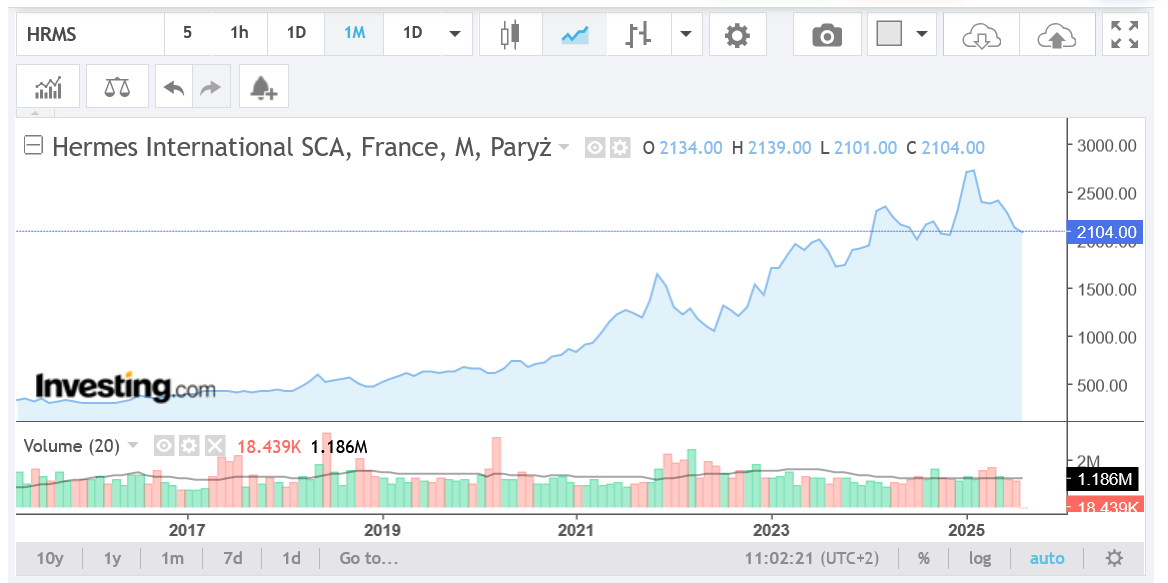The luxury goods market, including fashion houses, has recently become an extremely problematic area. Many companies previously seen as stable giants like Gucci (Kering) and LVMH, are recording losses. The luxury goods market is faltering and sales are falling. One of the few exceptions is the Hermes brand, which, despite the downturn, has been steadily posting increases. Is it worth investing in Hermes shares? What are the prospects and latest results?
Hermès – financial strength and market resilience
Hermès’ results for the first half of 2025 clearly demonstrate the strength of the company’s business model. The company reported an 8% increase in revenue to €8 billion. Operating profit, meanwhile, rose 6 percent, while maintaining an impressive operating margin of 41.4 percent. Particularly noteworthy is that Hermès recorded sales increases in all geographic regions. Surprisingly, the second quarter proved more dynamic than the first. This contrasts sharply with trends at competitors.
Growing revenues in an environment of market downturn is no accident. They are the result of a strategy that Hermès has been implementing for years. Limited supply, full control over production, and constant emphasis on the exclusivity of its products. For example, production continues to grow at a moderate rate of 6-7% per year. This maintains demand-supply tension and supports high prices.
Why are investors interested in Hermès shares?
In the investment world, Hermès is considered a quality compounder. A company with a sustainable competitive advantage, capable of generating high profits for many years, even in difficult conditions. The brand’s unique position in the ultra-luxury segment ensures customer loyalty and the ability to raise prices without losing demand. Products such as Birkin and Kelly handbags are not just accessories. Therefore, for many buyers, they are investment-grade assets whose value increases over time.

In addition, Hermès has a solid balance sheet. The company has almost no debt. It has high liquidity and regularly pays dividends. Admittedly, the dividend yield is about 0.5%, which may seem low, but in the case of premium companies, part of the value to the investor comes from the predictability of capital growth rather than a high current earnings payout.
Current valuation vs. prospects: is it too expensive?
Despite strong fundamentals, some analysts are expressing caution. The current valuation of Hermès shares is very high on a ratio basis. Both the price-to-earnings (P/E) and enterprise value to operating profit (EV/EBITDA) ratios suggest that investors have already largely “factored” future success into the share price.
Analysts predict that Hermès’ full-year 2025 revenue will grow by only about 3.3%. Earnings per share, on the other hand, will improve only slightly. UBS recently downgraded its recommendation for the company to “Neutral.” It points to possible weakening of pricing power, cooler premium customer sentiment, and slowing growth rates relative to the record years of 2021-2023.
Strengths of investing in Hermès shares:
- Hermès operates in the sector least sensitive to crises – ultra-premium customers are less likely to cut back on purchases in difficult times.
- The company controls the entire supply chain and production, which ensures quality and exclusivity.
- Family ownership promotes long-term management and resistance to hostile takeovers.
- The brand has unquestionable prestige and pricing power, which translates into financial stability and high profitability.
- Despite the low dividend, the company conducts regular share buybacks and maintains shareholder value growth.
Is it worth investing in Hermès shares in 2025?
For long-term investors who value stability, quality and resilience to business cycles, Hermès remains one of the most attractive European companies. It is a so-called “blue chip” luxury. A company with outstanding fundamentals and a predictable growth path. That’s why it retains value even during periods of market turbulence.
But for short-term investors hoping for quick profits, the current valuation may be a barrier. Hermès shares are already expensive. And a possible slowdown in growth, albeit mild, could limit the price’s momentum in the coming quarters.





